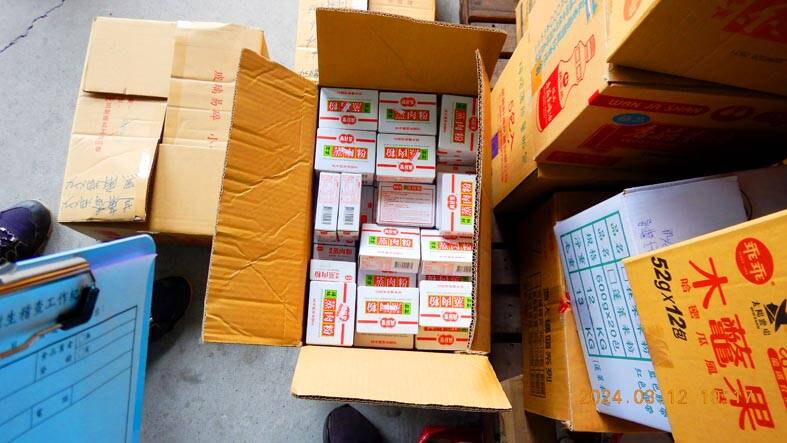As of Tuesday, a total of 24 batches of imported chili powder tainted with Sudan red dye — an industrial additive banned in foods — had been confirmed, and 547,238.2kg of the powders and food products that used them had been sealed or removed from shelves, the Food and Drug Administration (FDA) said yesterday.
The chili powders that failed inspections so far include 10 batches imported by Bao Hsin Enterprises Co (保欣企業) in New Taipei City from Sanhe Drug Co (三禾藥業) in China’s Henan Province.
Eleven batches were imported by Gin Zhan International Co (津棧國際貿易) in Kaohsiung and its affiliates, including one batch by Chia Guang International Co (佳廣國際貿易) and one by Kwang Yuan Co (廣元), which bought them from China’s Kavin Shipping Ltd, Eastrong International Co and Long Hai Tong Ji Foods Co (龍海同記食品).

Photo courtesy of the Taitung County Public Health Bureau
One batch was imported by Great Agar Enterprise Co (葛瑞特洋菜企業) in Tainan, which purchased the chili powder from China’s Zhecheng County Hengfeng (柘城縣恒豐食品) food company.
Two batches were imported by Chan Gu Products Co (長谷農產) in Yunlin County, which also sourced the chili powder from Hengfeng food company as well as Liability Limited Pacific Co in Vietnam.
The Ministry of Health and Welfare has promised to complete inspections and testings of tainted products by the end of the month, and work by the agency and local health departments are progressing on schedule, FDA Deputy Director-General Lin Chin-fu (林金富) said.
Moreover, members of the public are encouraged to report suspected food items, such as those that have chili powder with unnatural colors, he said.
The FDA will continue to accept reports and tip-offs after this month, he said.
Meanwhile, Wu Ying-cheng (吳映澄), a dietitian, wrote on her Facebook page that while many people are surprised that Sudan red tainted chili powder was found in shacha sauce, pepper powder, curry powder and other spices, the dyes have also been found in palm oil in other countries.
Citing data from FDA border inspections from 2015 to this year, Wu said that 53 food items were found to contain Sudan red, including rose petals, chili powder and chili oil, but not yet in palm oil.
Asked about Wu’s comment, Lin on Monday said that from 2021 to Sunday, Taiwan had only imported 13,051kg of palm oil, all of which have passed their expiration date by now.
As such, none are being sold at retailers now, but the agency will start batch-by-batch inspections of imported red palm oil and test them for Sudan red, Lin said.
Additional reporting by CNA

An undersea cable to Penghu County has been severed, the Ministry of Digital Affairs said today, with a Chinese-funded ship suspected of being responsible. It comes just a month after a Chinese ship was suspected of severing an undersea cable north of Keelung Harbor. The National Communications and Cyber Security Center received a report at 3:03am today from Chunghwa Telecom that the No. 3 cable from Taiwan to Penghu was severed 14.7km off the coast of Tainan, the Ministry of Digital Affairs said. The Coast Guard Administration (CGA) upon receiving a report from Chunghwa Telecom began to monitor the Togolese-flagged Hong Tai (宏泰)

A cat named Mikan (蜜柑) has brought in revenue of more than NT$10 million (US$305,390) for the Kaohsiung MRT last year. Mikan, born on April 4, 2020, was a stray cat before being adopted by personnel of Kaohsiung MRT’s Ciaotou Sugar Refinery Station. Mikan was named after a Japanese term for mandarin orange due to his color and because he looks like an orange when curled up. He was named “station master” of Ciaotou Sugar Refinery Station in September 2020, and has since become famous. With Kaohsiung MRT’s branding, along with the release of a set of cultural and creative products, station master Mikan

RISING TOURISM: A survey showed that tourist visits increased by 35 percent last year, while newly created attractions contributed almost half of the growth Changhua County’s Lukang Old Street (鹿港老街) and its surrounding historical area clinched first place among Taiwan’s most successful tourist attractions last year, while no location in eastern Taiwan achieved a spot in the top 20 list, the Tourism Administration said. The listing was created by the Tourism Administration’s Forward-looking Tourism Policy Research office. Last year, the Lukang Old Street and its surrounding area had 17.3 million visitors, more than the 16 million visitors for the Wenhua Road Night Market (文化路夜市) in Chiayi City and 14.5 million visitors at Tainan’s Anping (安平) historical area, it said. The Taipei 101 skyscraper and its environs —

Taiwan on Friday said a New Zealand hamburger restaurant has apologized for a racist remark to a Taiwanese customer after reports that it had first apologized to China sparked outrage in Taiwan. An image posted on Threads by a Taiwanese who ate at Fergburger in Queenstown showed that their receipt dated Sunday last week included the words “Ching Chang,” a racial slur. The Chinese Consulate-General in Christchurch in a statement on Thursday said it had received and accepted an apology from the restaurant over the incident. The comment triggered an online furor among Taiwanese who saw it as an insult to the